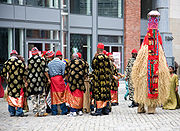
New Yam Festival of the Igbo
Encyclopedia

Yam (vegetable)
Yam is the common name for some species in the genus Dioscorea . These are perennial herbaceous vines cultivated for the consumption of their starchy tubers in Africa, Asia, Latin America and Oceania...
festival of the Igbo is an annual harvest festival
Harvest festival
A Harvest Festival is an annual celebration which occurs around the time of the main harvest of a given region. Given the differences in climate and crops around the world, harvest festivals can be found at various times throughout the world...
by the Igbo people
Igbo people
Igbo people, also referred to as the Ibo, Ebo, Eboans or Heebo are an ethnic group living chiefly in southeastern Nigeria. They speak Igbo, which includes various Igboid languages and dialects; today, a majority of them speak English alongside Igbo as a result of British colonialism...
held at the end of the rainy season in early August. The Iwa ji festival (literally "new-yam eating") is practiced throughout West Africa
West Africa
West Africa or Western Africa is the westernmost region of the African continent. Geopolitically, the UN definition of Western Africa includes the following 16 countries and an area of approximately 5 million square km:-Flags of West Africa:...
(especially in Nigeria
Nigeria
Nigeria , officially the Federal Republic of Nigeria, is a federal constitutional republic comprising 36 states and its Federal Capital Territory, Abuja. The country is located in West Africa and shares land borders with the Republic of Benin in the west, Chad and Cameroon in the east, and Niger in...
and Ghana
Ghana
Ghana , officially the Republic of Ghana, is a country located in West Africa. It is bordered by Côte d'Ivoire to the west, Burkina Faso to the north, Togo to the east, and the Gulf of Guinea to the south...
) and other African countries and beyond, symbolizing the conclusion of a harvest and the beginning of the next work cycle. The celebration is a very culturally based occasion, tying individual Igbo communities together as essentially agrarian and dependent on yam.
Yams are the first crop to be harvested, and are the most important crop of the region. The evening prior to the day of the festival, all old yams (from the previous year's crop) are consumed or discarded. The next day, only dishes of yam are served, as the festival is symbolic of the abundance of the produce.
Traditionally, the role of eating the first yam is performed by the oldest man in the community or the king (igwe). This man also offers the yams to God, deities and ancestors. It is believed that their position bestows the privilege of being intermediaries between their communities and the gods of the land. The rituals are meant to express the gratitude of the community to the gods for making the harvest possible, and they are widely followed despite more modern changes due to the influence of Christianity
Christianity
Christianity is a monotheistic religion based on the life and teachings of Jesus as presented in canonical gospels and other New Testament writings...
in the area.
The day is symbolic of enjoyment after the cultivation season, and the plenty is shared with friends and well-wishers. A variety of festivities mark the eating of new yam. Folk dance
Folk dance
The term folk dance describes dances that share some or all of the following attributes:*They are dances performed at social functions by people with little or no professional training, often to traditional music or music based on traditional music....
s, masquerade
Masquerade ceremony
A masquerade ceremony is a cultural or religious event involving the wearing of masks.Examples include the West African and African Diaspora masquerades, such as Egungun Masquerades, Northern Edo Masquerades, Caribbean Carnival and Jonkonnu.-External links:* - slideshow by Life magazine*...
s, parade
Parade
A parade is a procession of people, usually organized along a street, often in costume, and often accompanied by marching bands, floats or sometimes large balloons. Parades are held for a wide range of reasons, but are usually celebrations of some kind...
s, and parties create an experience that some participants characterize as "art"; the colorful festival is a spectacle of exhibited joy, thanks, and community display.
Palm oil
Palm oil
Palm oil, coconut oil and palm kernel oil are edible plant oils derived from the fruits of palm trees. Palm oil is extracted from the pulp of the fruit of the oil palm Elaeis guineensis; palm kernel oil is derived from the kernel of the oil palm and coconut oil is derived from the kernel of the...
(mmanu nri) is used to eat the yam. Iwa ji also shares some similarities with the Asian Mid-Autumn Festival
Mid-Autumn Festival
The Mid-Autumn Festival , also known as the Moon Festival or Mooncake Festival or Zhongqiu Festival, is a popular lunar harvest festival celebrated by Chinese and Vietnamese people. A description of the festival first appeared in Rites of Zhou, a written collection of rituals of the Western Zhou...
, as both are based on the cycles of the moon
Moon
The Moon is Earth's only known natural satellite,There are a number of near-Earth asteroids including 3753 Cruithne that are co-orbital with Earth: their orbits bring them close to Earth for periods of time but then alter in the long term . These are quasi-satellites and not true moons. For more...
and are essentially community harvest festivals.

